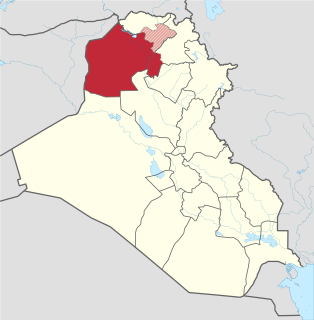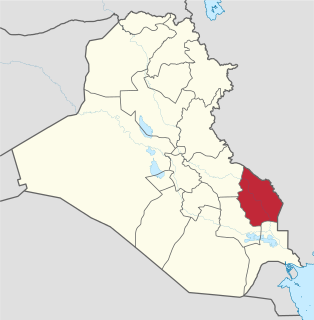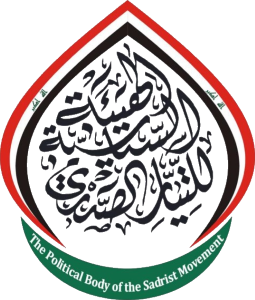| |||
All 31 seats for the Dhi Qar Governorate council | |||
|---|---|---|---|
| |||
The Dhi Qar governorate election of 2013 was held on 20 April 2013 alongside elections for all other governorates of Iraq outside Iraqi Kurdistan, Kirkuk, Anbar, and Nineveh.
| |||
All 31 seats for the Dhi Qar Governorate council | |||
|---|---|---|---|
| |||
The Dhi Qar governorate election of 2013 was held on 20 April 2013 alongside elections for all other governorates of Iraq outside Iraqi Kurdistan, Kirkuk, Anbar, and Nineveh.
| Party/Coalition | Allied national parties | Leader | Seats | Change | Votes | |
|---|---|---|---|---|---|---|
| State of Law Coalition | Nouri Al-Maliki | 10 | 176,861 | |||
| Citizens Alliance | Ammar al-Hakim | 7 | 122,088 | |||
| Liberal Coalition | Muqtada al-Sadr | 7 | - | 81,338 | ||
| Solidarity with Iraq | Talib Qathem Abdul Karim Al Hassan | 3 | 50,363 | |||
| National Loyalty Bloc | Habib Nour Mahdi Nehme | 3 | 43,369 | |||
| National Partnership Gathering | Hamid naim Khudayr Abdullah | 2 | 26,670 | |||
| Civil Democratic Coalition | Shahid Ahmad Hassan Mohamed | 1 | 17,906 | |||
| Al Iraqia National and United Coalition | Ayad Allawi | 6,855 | ||||
| Law Advocate Knights' Bloc | 5,698 | |||||
| Iraq’s Benevolence and Generosity List | 3,167 | |||||
| Total | 31 | 534,315 | ||||
| Sources: al-Sumaria - Dhi Qar Coalitions, ISW, IHEC | ||||||
The politics of Iraq take place in a framework of a federal parliamentary representative democratic republic. It is a multi-party system whereby the executive power is exercised by the Prime Minister of the Council of Ministers as the head of government, as well as the President of Iraq, and legislative power is vested in the Council of Representatives and the Federation Council.

Kirkuk Governorate or Kirkuk Province is a governorate in northern Iraq. The governorate has an area of 9,679 square kilometres (3,737 sq mi). In 2017 the estimated population was 1,259,561 people. The provincial capital is the city of Kirkuk. It is divided into four districts.

Nineveh Governorate is a governorate in northern Iraq. It has an area of 37,323 km2 (14,410 sq mi) and an estimated population of 2,453,000 people as of 2003. Its largest city and provincial capital is Mosul, which lies across the Tigris river from the ruins of ancient Nineveh. Before 1976, it was called Mosul Province and included the present-day Dohuk Governorate. The second largest city is Tal Afar, which has an exclusively Turkmen population.

Maysan Governorate is a governorate in southeastern Iraq, bordering Iran. Its administrative centre is the city of Amarah, and it is composed of six districts. Before 1976, it was named Amara Province.

Al Anbar Governorate, or Anbar Province, is the largest governorate in Iraq by area. Encompassing much of the country's western territory, it shares borders with Syria, Jordan, and Saudi Arabia. The provincial capital is Ramadi; other important cities include Fallujah and Al-Qa'im.

The Iraqi Islamic Party is the largest Sunni Islamist political party in Iraq as well as the most prominent member of the Iraqi Accord Front political coalition. It was part of the government of Prime Minister Nouri al-Maliki and is part of the current government of Haider al-Abadi since 2014. Osama Tawfiq al-Tikriti succeeded Vice-President Tariq al-Hashimi as the party's secretary-general on 24 May 2009, who was succeeded in July 2011 by Ayad al-Samarrai.

The Council of Representatives is the unicameral legislature of the Republic of Iraq. As of 2020, it comprises 329 seats and meets in Baghdad inside the Green Zone.

The Iraqi Turkmen Front, also abbreviated as ITF, is a political movement representing the Iraqi Turkmen people. It was founded on April 5, 1995 as a coalition of several Turkmen parties operating within the framework of Iraq's unity. The party aims for the Turkmen community to have greater political involvement, increased recognition and more rights.

The electorate of Iraq went to the polls on 15 October 2005 to vote in a referendum on whether or not to ratify the proposed constitution of Iraq. After 10 days of counting votes, the country's electoral commission announced that the constitution had been approved by a wide margin nationwide. A number of critics allege massive irregularities, especially in the crucial province of Nineveh, which was widely expected to provide the third "no" vote.

The Sadrist Movement is an Iraqi Islamic national movement led by Muqtada al-Sadr. The movement draws wide support from across Iraqi society and especially from the Shi'a poor in the country. The most important person in setting the goals and the philosophy of the movement was Grand Ayatollah Mohammad Mohammad Sadeq al-Sadr. A prominent preceding influence had also been Muhammad Baqir al-Sadr. The movement is religious and populist. Its goal is a society ordered by a combination of religious laws and tribal customs.
The federal government of Iraq is defined under the current Constitution, approved in 2005, as an Islamic, democratic, federal parliamentary republic. The federal government is composed of the executive, legislative, and judicial branches, as well as numerous independent commissions.

Governorate or provincial elections were held in Iraq on 31 January 2009, to replace the local councils in fourteen of the eighteen governorates of Iraq that were elected in the 2005 Iraqi governorate elections. 14,431 candidates, including 3,912 women, contested 440 seats. The candidates came from over 400 parties, 75% of which were newly formed.

The following outline is provided as an overview of and topical guide to Iraq:

The State of Law Coalition also known as Rule of Law Coalition is an Iraqi political coalition formed for the 2009 Iraqi governorate elections by the Prime Minister of Iraq at the time, Nouri al-Maliki, of the Islamic Dawa Party.

Assyrian politics in Iraq have been taking many different turns since the US invasion of Iraq in 2003. Today, there are many different Assyrian political parties in Iraq. The main Assyrian party that came out from the 2005 elections was the Assyrian Democratic Movement. However, Sarkis Aghajan began to challenge its power beginning in 2006 with the opening of Ishtar TV and the KDP-affiliated Chaldean Syriac Assyrian Popular Council.

Governorate or provincial elections were held in Iraq on 20 April 2013, to replace the local councils in the governorates of Iraq that were elected in the Iraqi governorate elections of 2009. Elections took place in 12 of Iraq's 18 governorates. Elections didn't take place in the 3 governorates forming the Kurdistan Region or Kirkuk, Anbar, or Nineveh, meaning that a total of 378 provincial council seats were up for election.

The 2013 Nineveh Governorate election in Iraq was held on 20 June with elections for the Al Anbar Governorate. Due to security problems, turnout was less than half that of the 2009 election. This election saw Sunni Arab parties lose a number of seats to minority parties.

Parliamentary elections were held in Iraq on 30 April 2014. The elections decided the 328 members of the Council of Representatives who will in turn elect the Iraqi President and Prime Minister.

The Uniters for Reform Coalition is a Sunni political coalition in Iraq.

Governorate or provincial elections were scheduled to be held in Iraq on 20 April 2020, to replace the provincial councils in the governorates of Iraq that were elected in the 2013 Iraqi governorate elections and, in Kurdistan Region, in the 2014 elections. The elections were delayed indefinitely in November 2019, amidst demonstrations demanding the end of the existing political system. In the summer of 2020, after protests around the country specifically demanded the dissolution of provincial administrations, the ruling parties decided to postpone any decision on when to hold new provincial elections until after the early parliamentary election planned for October 2021.